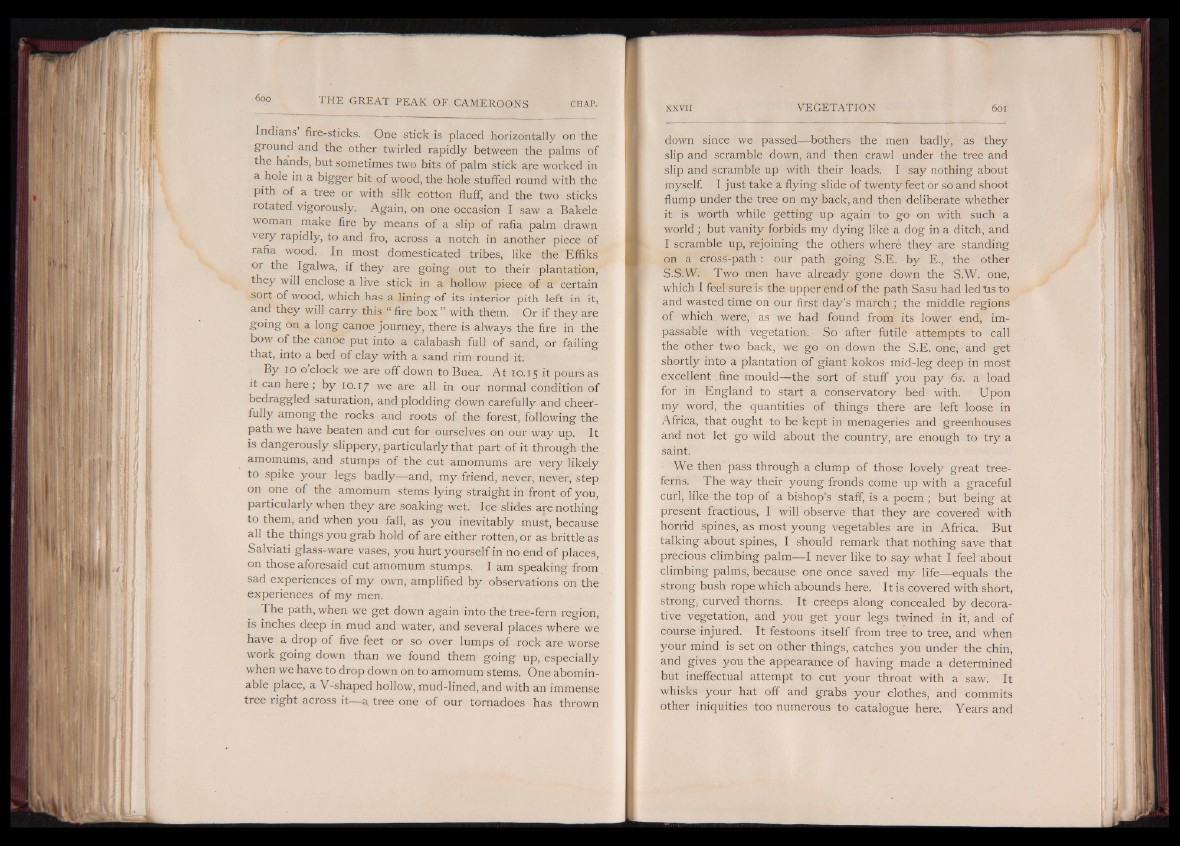
Indians fire-sticks. One stick is placed horizontally on the
ground and the other twirled rapidly between the palms of
the hands, but sometimes two bits of palm stick are worked in
a hole in a bigger bit of wood, the hole stuffed round with the
pith of a tree or with silk cotton fluff, and the two sticks
rotated vigorously. Again, on one occasion I saw a Bakele
woman make fire by means of a slip of rafia palm drawn
very rapidly, to and fro, across a notch in another piece of
rafia wood. In most domesticated tribes, like the Efifiks
or the Igalwa, if they are going out to their plantation,
they will enclose a live stick in a hollow piece of a certain
sort of wood, which has a lining of its interior pith left in it,
and they will carry this “ fire box ” with them. Or if they are
going on a long canoe journey, there is always the fire in the
bow of the canoe put into a calabash full of sand, or failing
that, into a bed of clay with a sand rim round it.
By 10 o clock we are off down to Buea. At 10.15 it pours as
it can here; by 10.17 we are all in our normal condition of
bedraggled saturation, and plodding down carefully and cheerfully
among the rocks and roots of the forest, following the
path we have beaten and cut for ourselves on our way up. It
is dangerously slippery, particularly that part of it through the
amomums, and stumps of the cut amomums are very likely
to spike your legs badly— and, my friend, never, never, step
on one of the amomum stems lying straight in front of you,
particularly when they are soaking wet. Ice slides are nothing
to them, and when you fall, as you inevitably must, because
all the things you grab hold of are either rotten, or as brittle as
Salviati glass-ware vases, you hurt yourself in no end of places,
on those aforesaid cut amomum stumps. I am speaking from
sad experiences of my own, amplified by observations on the
experiences of my men.
The path, when we get down again into the tree-fern region,
is inches deep in mud and water, and several places where we
have a drop of five feet or so over lumps of rock are worse
work going down than we found them going up, especially
when we have to drop down on to amomum stems. One abominable
place, a V-shaped hollow, mud-lined, and with an immense
tree right across it— a tree one of our tornadoes has thrown
down since we passed— bothers the men badly, as they
slip and scramble down, and then crawl under the tree and
slip and scramble up with their loads. I say nothing about
myself. I just take a flying slide of twenty feet or so and shoot
flump under the tree on my back, and then deliberate whether
it is worth while getting up again to go on with such a
world ; but vanity forbids my dying like a dog in a ditch, and
I scramble up, rejoining the others where they are standing
on a cross-path: our path going S.E. by E., the other
S.S.W. Two men have already gone down the S.W. one,
Which I feel sure is the upper end of the path Sasu had led hs to
and wasted time on our first day’s march ; the middle regions
of which were, as we had found from its lower end, impassable
with vegetation. So after futile attempts to call
the other two back, we go on down the S.E. one, and get
shortly into a plantation of giant kokos mid-leg deep in most
excellent fine mould—the sort of stuff you pay 6s. a load
for in England to start a conservatory bed with. Upon
my word, the quantities of things there are left loose in
Africa, that ought to be kept in menageries and greenhouses
and not let go wild about the country, are enough to try a
saint.
We then pass through a clump of those lovely great tree-
ferns. The way their young fronds come up with a graceful
curl, like the top of a bishop’s staff, is a poem ; but being at
present fractious, I will observe that they are covered with
horrid spines, as most young vegetables are in Africa. But
talking about spines, I should remark that nothing save that
precious climbing palm— I never like to say what I feel about
climbing palms, because one once saved my life— equals the
strong bush rope which abounds here. It is covered with short,
strong, curved thorns. It creeps along concealed by decorative
vegetation, and you get your legs twined in it, and of
course injured. It festoons itself from tree to tree, and when
your mind is set on other things, catches you under the chin,
and gives you the appearance of having made a determined
but ineffectual attempt to cut your throat with a saw. It
whisks your hat off and grabs your clothes, and commits
other iniquities too numerous to catalogue here. Years and